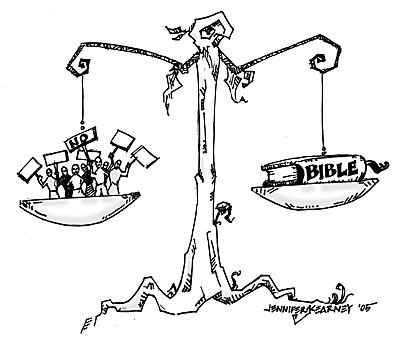
Illustration by Jennifer Kearney
|
|
By Matt Stone
Arizona Daily Wildcat
Monday, December 5, 2005
Print this
Something's gone wrong with the Christian conservative movement. Something's amiss. And beneath the farcical surface of "Breaking News"-prone politics, an infection is spreading through the ranks, silent, surreptitious and ultimately debilitating for a movement that found its legs and voice in the 30 years since Roe v. Wade.
Christian conservatism has abdicated the respectability of moralism for the self-righteousness of morals - and America is worse off today because of it.
Moralism represents the self-understanding of what constitutes decent and indecent behavior - each person one's own judge and seeking respect in the appraisal of others.
Of course, the perception of "decent" or "indecent" behavior is fluid, allowing open-endedness for society to shape its own moral code: Whereas we abhor polygamy today, it was yawningly normal for Moses to have multiple wives. Dynamism, self-respect and the dignity of the individual are the cardinal tenets of moralism.
Morals are the troglodyte brethren of moralism. Morals - "Thou shall not ..." - immediately take on the haughtiness of unthinking self-righteousness. But a moral itself is not inherently wrong because it is categorical: Murder, rape and theft are rightly considered immoral acts by a vast majority of humans worldwide.
But therein lies the rub. Morals derive their sanction from the popular (and often unquestioned) support of society. Moralism gives that society the opportunity to decide what is moral and immoral through flourishing debate, begotten by a populace who consciously desire the betterment of society.
It seems that America's Christian conservatives have forgotten this tenet - that which they held dear for so long.
For years, the Christian conservative movement admirably sought the improvement of society on the moral front (and thereby, the spiritual front). They pursued a reduction of sex and violence in the mass media, they took aim at pornography, they promoted charity toward the homeless, orphans, refugees, etc.
Christian conservatives were instrumental in using American clout to resolve the Sudanese civil war. Of all things, Christian conservatives were pushing moralism. They were pushing people to live decently, absent overt violence, sex, war and poverty.
But something happened in 2000 that surprised the Christian conservatives as much as the rest of America: The White House was suddenly a close ally. Power, power, power, and how sweet it would be if the Christian conservative movement had used it appropriately.
Instead of promoting moralism in America, Christian conservatives turned to legislating specific "morals." These are often outside the realm of overwhelming popular support, thereby making their "moral" authority circumspect.
When an issue is too cloudy to declare moral or immoral - abortion and gay marriage come to mind - government should keep its invasive paws off and let the people live their lives without the meddling of Washington. Morality is not dictated by law. Morality cannot be dictated by law.
What Christian conservatives should do, and what they have done until recently, is push the debate on what constitutes a "moral life." By doing so, they will effectively and lastingly shape society: the people as the wellspring of change, not top-down dictums from Washington. Sorry, Pat Roberts, this precludes a constitutional amendment banning gay marriage.
Don't legislate morality. Let freedom ring.
Indeed, the recent strategy of legislating specific, controversial morals rather than a general campaign for moralism is indicative of weakness rather than strength. The movement knows that its current political power exceeds its popular support. Such a top-heavy situation is sure to collapse.
Hence, the moral blitzkrieg: the most salient way to push the agenda. But a moral blitzkrieg is exactly what will undo this movement, for a majority does not want Washington telling them what constitutes moral and immoral action.
America needs a strong and viable Christian conservative movement, but it needs one that foments debate among all groups about what constitutes the "moral" life. Does homosexuality preclude morality? Does having an abortion? These are topics that deserve a respectful and meticulous discussion. That develops from the bottom; the answers cannot be imposed from the top.
While we wait for that movement to return, much will be said about the future viability of Christian conservatism: its rise as the response to the moral relativism of the '60s and '70s, its promising demographic future in the exurbs of America's cities, its roots in the megachurch phenomenon, its newfound appeal on college campuses.
But what's being forgotten is the intellectual underpinnings of the movement, and those underpinnings are disturbingly absent from the current political agenda.
Welcome to mid-Victorian America. Population: would-be saints and "everyone else."
Matt Stone is a junior majoring in international studies and economics. He can be reached at letters@wildcat.arizona.edu.
